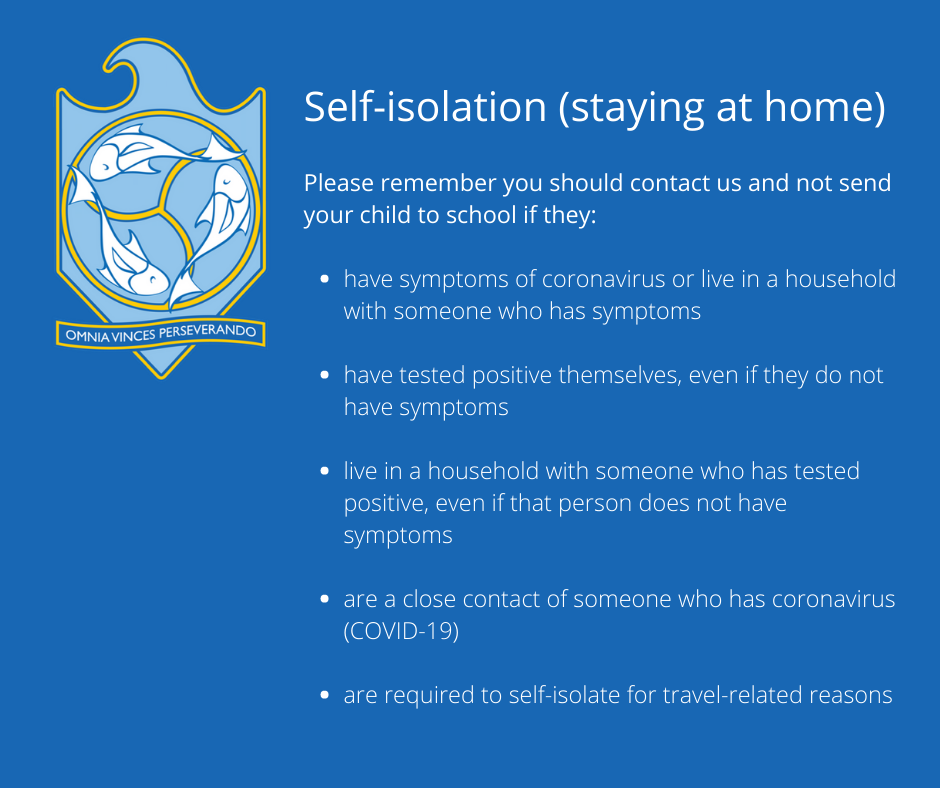School updates and advice
The Headteacher will update parents by email and we ask you to please keep up-to-date with reading these. Copies of most letters emailed home are available here. These have included guidance from the government, information on what the School is doing, what is asked of parents and pupils, good news stories, and information on the latest developments.
Self-isolation (staying at home)
You should not send your child to school if they:
- have symptoms of coronavirus or live in a household with someone who has symptoms
- have tested positive themselves, even if they do not have symptoms
- live in a household with someone who has tested positive, even if that person does not have symptoms
- are a close contact of someone who has coronavirus (COVID-19)
- are required to self-isolate for travel-related reasons
If your child is identified as a close contact of someone who has tested positive for coronavirus (COVID-19) and is asked to self-isolate, you do not need to self-isolate unless your child develops symptoms. This also applies to other members of your household (including any other children in the same school or college).
If your child has been a close contact of someone who has tested positive, and then develops symptoms but has a negative test result, they will still need to self-isolate for the full 10 days from the day after contact with the person who tested positive.
Close contacts
At the time of writing, a contact is defined as below.
A contact is a person who has been close to someone who has tested positive for COVID-19. You can be a contact any time from 2 days before the person who tested positive developed their symptoms (or, if they did not have any symptoms, from 2 days before the date their positive test was taken), and up to 10 days after, as this is when they can pass the infection on to others. A risk assessment may be undertaken to determine this, but a contact can be:
- anyone who lives in the same household as another person who has COVID-19 symptoms or has tested positive for COVID-19
- anyone who has had any of the following types of contact with someone who has tested positive for COVID-19 with a PCR or LFD test
- face-to-face contact including being coughed on or having a face-to-face conversation within one metre
- been within one metre for one minute or longer without face-to-face contact
- sexual contact
- been within 2 metres of someone for more than 15 minutes (either as a one-off contact, or added up together over one day)
- travelled in the same vehicle or a plane
An interaction through a Perspex (or equivalent) screen with someone who has tested positive for COVID-19 is not usually considered to be a contact, as long as there has been no other contact such as those in the list above.
If you are a contact of someone who has tested positive for COVID-19 you will be notified by the NHS Test and Trace service via text message, email or phone and should follow this guidance closely.
Contacting the NHS
This will help protect others in the community while you are infectious if you do have the virus. There is no longer any need to contact NHS 111 to tell them you are self-isolating, only if:
- you feel you cannot cope with your symptoms at home
- your condition gets worse
- your symptoms do not get better after 7 days
and then to only call 111 if you cannot get help online.
You should not go to a GP surgery, pharmacy or hospital.
PLEASE CONTACT THE SCHOOL TO LET US KNOW IF YOU AND YOUR CHILD/REN ARE SELF-ISOLATING.
Please see the UK Government Coronavirus advice website and/or the NHS guidance page for more information. These have links to all the information you will need.

Social distancing and gatherings
Please keep up to date with latest advice about social distancing and gatherings and how these apply to your family outside of school.
DfE Helpline
The Department for Education has a helpline to answer questions about the virus related to education, which staff, parents and young people can contact, details are as follow:
Phone: 0800 046 8687
Email: DfE.coronavirushelpline@education.gov.uk
Opening hours: 8am to 6pm (Monday to Friday)
Holidays
You should plan your holidays within school and college holidays as usual, and avoid seeking permission to take your children out of school or college during term time. You should make sure any travel is in line with national travel guidance.
Keep in mind that you and your children may need to self-isolate when you return from a trip overseas.